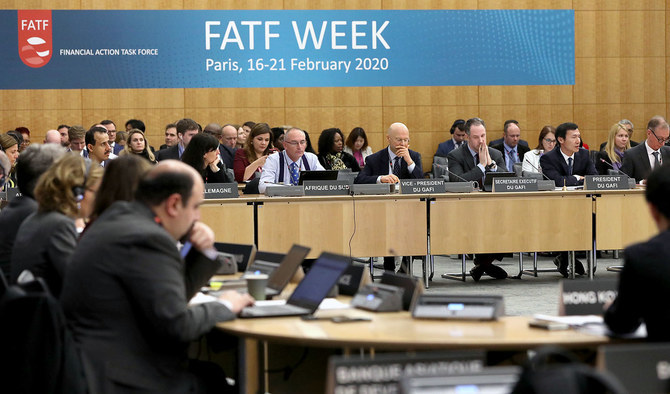ISLAMABAD: Pakistan is hopeful this week's meeting of the Financial Action Task Force (FATF) will remove it from an international “grey list” of nations falling short of global money laundering rules, officials said on Sunday.
The global watchdog put Pakistan onto the list in 2018 at the urging of the United States. In the last plenary meeting in October, FATF announced that Pakistan would remain on its grey list until February for not meeting six out of 27 action plan items on curbing money laundering that benefited terrorism groups.
FATF's upcoming virtual plenary meeting will be held in Paris from Monday to Thursday.
"We hope that the FATF plenary would acknowledge and appreciate our actions,” Pakistan’s foreign office spokesperson Zahid Hafeez Chaudhri told Arab News.
"FATF is a technical body, and we expect it to take a decision based on the merits of our case," he said, adding that Islamabad has been fully committed to implementing the remaining points and undertook "painstaking efforts" towards this end.
"In the remaining six partially addressed items, significant progress has been made by Pakistan, which is duly acknowledged by the wider FATF membership," Chaudhri said.
To comply with the watchdog's requirements, Pakistan last year passed new legislations that include actions for freezing and seizure of assets and travel bans and arms embargoes on entities and individuals designated on UN sanctions' lists. They also introduce measures to impose heavy fines and long-term jail sentences on those involved in terror financing.
According to Dr. Abid Qayyum Sulehri, member of the government’s Economic Advisory Council, Pakistan's regulatory processes have been very satisfactory and now all will depend on diplomacy.
"There is no major bottleneck in the legislations or other action plans. It is now purely depending upon diplomatic outreach by Pakistan. Islamabad has to increase its diplomatic efforts to get required 13 votes to come out of the grey list," he said, adding that Pakistan may face some resistance from France and the US.
France, Sulehri told Arab News, may want to keep Pakistan on the grey list as earlier this month Islamabad reached an agreement with a hardline religious party to discuss in parliament severing ties with Paris as French President Emmanuel Macron recently defended the publication of cartoons depicting Prophet Muhammad.
Resistance from the US, Sulehri added, may come "due to its concern over the acquittal of Omar Sheikh one of the accused in Daniel Pearl murder case."
In late January, a top Pakistani court ordered the release of Ahmed Omar Sheikh, a British-born Pakistani convicted of the 2002 kidnapping and beheading of American journalist Daniel Pearl.
Dr. Zubair Khan, an economist and financial politics expert, said pressure to keep Pakistan on the grey list may also be due to regional politics as the US and India "want to keep Pakistan under pressure for their regional gains."
"We have laws in place which are being implemented. The laws are passed by the parliament and the FATF member countries, which themselves campaign for democratic norms, should give the Pakistani parliament its due time to complete its process on legislation," Khan said.
"It is high time to make FATF a meaningful body and stop using it for political purposes."
















